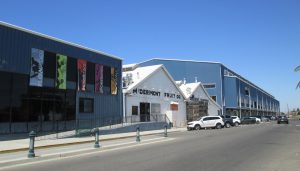
In 2005, Lindsay City Council was looking for ideas. The city had suffered a freeze and the loss of the Lindsay Olive Plant in the ’90s. The city needed a new identity, a sense of pride.
Council traveled to a conference in New York, to learn about how to develop a walking-city. They visited Chelsea Piers, a renovated area of former pier loading docks, now the focus of fitness, sports and fun, and thought, ‘what if?’
Chelsea Piers is in Manhattan. Lindsay was a town of 12,000 in the South Valley.
Still upon return, then Councilman Esteban Velasquez entered into a discussion with then City Manager Scot Townsend, seeing the abandoned McDermont Fruit Packing House in a new light.
“’This could be our Chelsea Piers,’ I exclaimed,” he now says.
Velasquez is again on the city’s council and has retained his faith in the converted packing house.
It was purchased by the city in 2006. It was to be the River City Boys’ Band of Lindsay – the pride of the city. With a soft opening of its basketball courts in late 2007, the Field House officially opened in June, 2008.
Today, it is a premier sports complex and entertainment center in the Valley, but has not quite reached the notoriety or financial status that was hoped for back in the day.
According to the McDermont Field House website, “The Field House takes its name from the former owner of the packinghouse, Merwyn Arthur McDermont (1918-1988). He purchased the packinghouse in Lindsay in 1955 and established McDermont Fruit Co.”
The history ends with, “Merwyn sold off his properties in the 1970s, including the three packinghouses.
“The Lindsay facility was abandoned in the early 1990s. In 2005, the City of Lindsay ‘rediscovered’ the property and purchased it in order to begin the construction of McDermont Field House in 2006.”
The Field House was developed in three segments, said Lindsay Mayor Pam Kimball.
The southern end was redeveloped into a sports complex with volleyball and basketball courts.
The center, where the actually packing of fruit took place, was turned into the main entrance and an arcade.
The third segment to the north, was all new and houses an indoor soccer fields and more.
“It cost us more than anticipated,” Kimball said, “more than council realized at the time.”
And then the recession hit.
“It hit us hard,” she said, “and we realize that perhaps we should have pulled back.
[Before] redevelopment was going to be big for us. We were anticipating a lot of nice homes being built – it never happened. And, worst of all, there were no funds to promote it.”
Still, “it has given the city a source of pride,” Kimball continued. “The youth have something that is really great for them.”
“I’ll claim it,” Velasquez said of the idea of turning the old packing house into a recreational facility and attraction.
“We were looking to bring people to the center of the community and to get more foot-traffic” he said. “You have to have a vision to do stuff.
“It has transformed lives.”
Velasquez tells a story of a woman who lost more than 100 pounds through working out in the Field House, and she has now become a trainer there.
He also told of a 90-something year-old man who is there working out all most every morning when Velasquez goes to do his work out.
Both Kimball and Velasquez find it hard to measure dollars to the health and pride the Field House has brought to the community.
“Of course we want it to pencil out – we want to make it work,” Velasquez exclaimed. “We have to keep trying.”
Trying they will continue to do.
Until the Field House can actually perceive any actual income, there is still a lot of debt to pay.
It holds an obligation bond through US Bank in the amount of $1, 837,000 to be paid off by 2026.
An obligation that the city must meet, if the Field House cannot make a payment, according to the city Finance Director Bret Harmon.
As a separate budget within the city, the Field House owes the city’s general fund approximately $13 ½ million. The council is currently working on just how this obligation can be paid, including the possibility of deferments until the obligation fund has been paid off. The matter was removed from the agenda at the last council meeting for further discussion in the future.
The Field House does add to the city’s sales tax receipts, which will increase starting in October with the passage of Measure O by local voters. While the Field House is well-utilized by the city, schools and residents of Lindsay, it seems to have failed to draw the anticipated crowds from around the county and the Valley. Council and, no doubt, staff of the Field House, hold out hope that with the outgrowth of the recession, the attraction will further its reach.
The McDermont Field House offers day passes from $5-20. Memberships start at $24.99/month or $19.99/month with a yearly contract. For more information, call (559) 562-3326.
